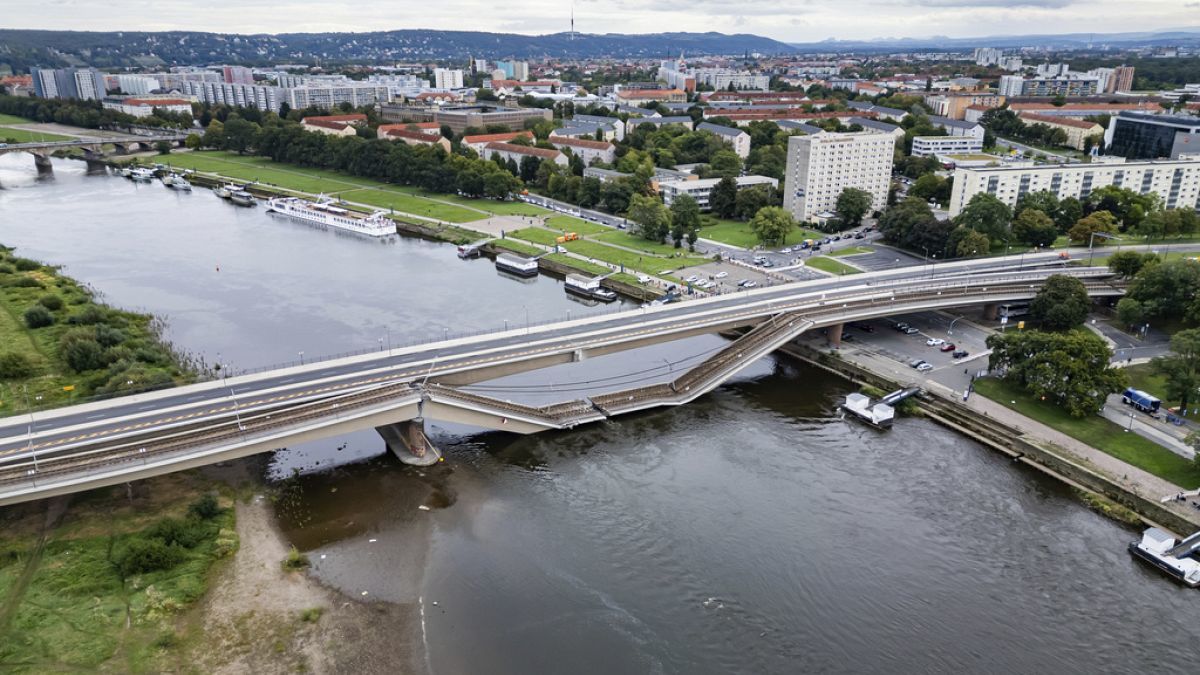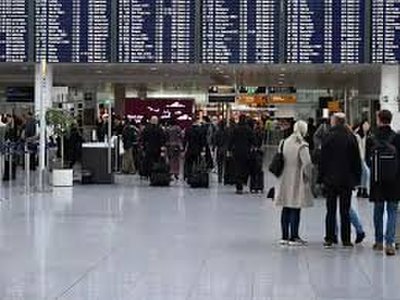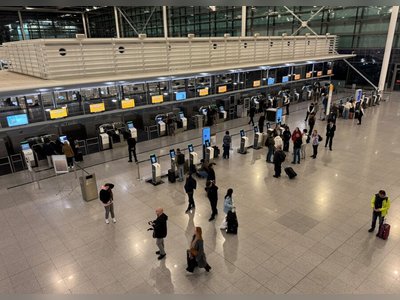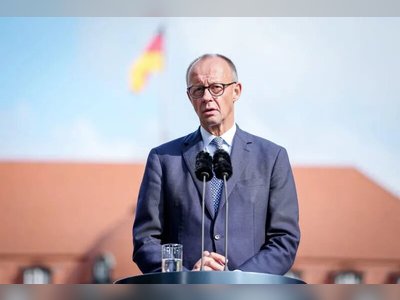
Challenges in Germany's Infrastructure: A Comprehensive Overview
Following a significant bridge collapse, Germany confronts mounting infrastructure deficits across various sectors.
On September 11, 2024, the Carola Bridge, located in the historic Old Town of Dresden, collapsed, fortunately resulting in no fatalities or injuries.
This incident has highlighted ongoing concerns regarding infrastructure maintenance in Germany, with the corroded state of steel used in the bridge's construction between 1967 and 1971 cited as the primary cause of the failure.
Germany is home to approximately 130,000 bridges, with nearly 40,000 positioned on highways and interstate roads.
According to the Federal Ministry of Transport, around 5,000 of these structures are deemed in urgent need of repair or replacement.
For 2024, €4.6 billion (equivalent to $5.01 billion) has been allocated for the renovation of highways, interstates, and their associated bridges.
However, discussions on the 2025 budget included a projected €5 billion for these projects, a figure the federally owned Autobahn-GmbH has indicated is insufficient given the extensive maintenance needs.
The decay of infrastructure extends beyond bridges, affecting railroads, energy and water systems, telecommunications, as well as educational and healthcare facilities.
Lars Klingbeil, co-chairman of the Social Democratic Party (SPD), emphasized the severity of the situation, stating that the country is 'running on empty.' Plans to overhaul the national rail network have identified a funding shortfall of around €13 billion.
By 2030, Deutsche Bahn intends to repair its 40 most critical track sections, which span approximately 4,200 kilometers (2,610 miles).
The Stuttgart 21 Railroad Station exemplifies the rising costs associated with transport infrastructure projects, with estimates for its completion rising from €4 billion to €11 billion since construction began 15 years ago.
The Federation of German Industries has projected a need for €165 billion for transport infrastructure over the next decade.
While the current Minister of Transport, Volker Wissing, aimed to establish a multi-billion euro infrastructure fund, efforts to mobilize private capital for this endeavor have not materialized.
In the realm of energy, significant investments are necessary to upgrade the electricity grid to accommodate the increasing demand for renewable energy, particularly from wind sources located in northern Germany.
Estimates suggest that expanding the electricity grids might incur costs of around €55 billion, with an additional €110 billion required for local distribution networks by 2033. These expenses have often been transferred to consumers and businesses, potentially undermining Germany's competitive position internationally.
Housing shortages have become acute, particularly in metropolitan areas where rising rents have displaced many residents.
In Munich, rents for new leases have reached €24 per square meter, presenting challenges for those with average incomes and forcing employers to provide housing incentives.
The Federation of German Industries has indicated that approximately €56 billion is needed over the next decade to promote housing construction and ensure environmentally friendly development.
The education sector also faces substantial financial demands, with estimates for renovating educational facilities and digitalizing institutions ranging from €100 billion to €130 billion.
The Education and Science Workers' Union (GEW) has pointed to a critical shortage of skilled workers in daycare centers and schools, underlining the urgent need for investment in education.
In the healthcare domain, the investment backlog is roughly €50 billion, with about 70% of German hospitals reportedly operating at a loss.
Furthermore, disaster relief preparedness requires an estimated €10 billion to address crises, including natural disasters and potential conflicts.
As debates continue around budget allocations, various sectors across Germany face pressing needs for extensive investment, totaling potentially hundreds of billions of euros to restore and enhance the nation’s technical and social infrastructure.
This incident has highlighted ongoing concerns regarding infrastructure maintenance in Germany, with the corroded state of steel used in the bridge's construction between 1967 and 1971 cited as the primary cause of the failure.
Germany is home to approximately 130,000 bridges, with nearly 40,000 positioned on highways and interstate roads.
According to the Federal Ministry of Transport, around 5,000 of these structures are deemed in urgent need of repair or replacement.
For 2024, €4.6 billion (equivalent to $5.01 billion) has been allocated for the renovation of highways, interstates, and their associated bridges.
However, discussions on the 2025 budget included a projected €5 billion for these projects, a figure the federally owned Autobahn-GmbH has indicated is insufficient given the extensive maintenance needs.
The decay of infrastructure extends beyond bridges, affecting railroads, energy and water systems, telecommunications, as well as educational and healthcare facilities.
Lars Klingbeil, co-chairman of the Social Democratic Party (SPD), emphasized the severity of the situation, stating that the country is 'running on empty.' Plans to overhaul the national rail network have identified a funding shortfall of around €13 billion.
By 2030, Deutsche Bahn intends to repair its 40 most critical track sections, which span approximately 4,200 kilometers (2,610 miles).
The Stuttgart 21 Railroad Station exemplifies the rising costs associated with transport infrastructure projects, with estimates for its completion rising from €4 billion to €11 billion since construction began 15 years ago.
The Federation of German Industries has projected a need for €165 billion for transport infrastructure over the next decade.
While the current Minister of Transport, Volker Wissing, aimed to establish a multi-billion euro infrastructure fund, efforts to mobilize private capital for this endeavor have not materialized.
In the realm of energy, significant investments are necessary to upgrade the electricity grid to accommodate the increasing demand for renewable energy, particularly from wind sources located in northern Germany.
Estimates suggest that expanding the electricity grids might incur costs of around €55 billion, with an additional €110 billion required for local distribution networks by 2033. These expenses have often been transferred to consumers and businesses, potentially undermining Germany's competitive position internationally.
Housing shortages have become acute, particularly in metropolitan areas where rising rents have displaced many residents.
In Munich, rents for new leases have reached €24 per square meter, presenting challenges for those with average incomes and forcing employers to provide housing incentives.
The Federation of German Industries has indicated that approximately €56 billion is needed over the next decade to promote housing construction and ensure environmentally friendly development.
The education sector also faces substantial financial demands, with estimates for renovating educational facilities and digitalizing institutions ranging from €100 billion to €130 billion.
The Education and Science Workers' Union (GEW) has pointed to a critical shortage of skilled workers in daycare centers and schools, underlining the urgent need for investment in education.
In the healthcare domain, the investment backlog is roughly €50 billion, with about 70% of German hospitals reportedly operating at a loss.
Furthermore, disaster relief preparedness requires an estimated €10 billion to address crises, including natural disasters and potential conflicts.
As debates continue around budget allocations, various sectors across Germany face pressing needs for extensive investment, totaling potentially hundreds of billions of euros to restore and enhance the nation’s technical and social infrastructure.
Translation:
Translated by AI
AI Disclaimer: An advanced artificial intelligence (AI) system generated the content of this page on its own. This innovative technology conducts extensive research from a variety of reliable sources, performs rigorous fact-checking and verification, cleans up and balances biased or manipulated content, and presents a minimal factual summary that is just enough yet essential for you to function as an informed and educated citizen. Please keep in mind, however, that this system is an evolving technology, and as a result, the article may contain accidental inaccuracies or errors. We urge you to help us improve our site by reporting any inaccuracies you find using the "Contact Us" link at the bottom of this page. Your helpful feedback helps us improve our system and deliver more precise content. When you find an article of interest here, please look for the full and extensive coverage of this topic in traditional news sources, as they are written by professional journalists that we try to support, not replace. We appreciate your understanding and assistance.











